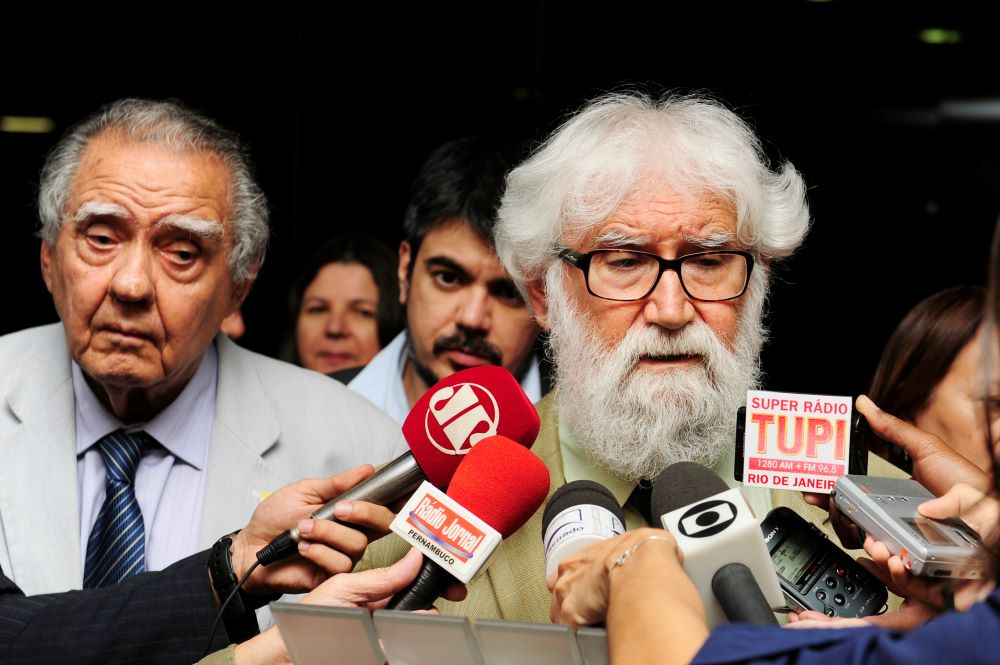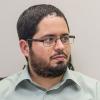Pope Francis meets Fr. Gustavo Gutiérrez, considered the father of liberation theology, in an undated photo. Gutiérrez, a Peruvian theologian and a Dominican priest, died in 2024 at age 96. He was censured by Pope John Paul II in 1984. (OSV News photo/Courtesy Archdiocese of Lima)
There is every indication that Pope Leo XIV could follow Pope Francis’ embrace of liberation theology, a politically tinged movement that emerged in the 1970s and championed the liberation from social, political and economic oppression as a path to salvation.
Pope Leo XIV’s roots, training, missionary work, and even the name he selected as pope all point to a strong possibility that the new pontiff could be a cheerleader for liberation theology, said leading scholars in the field.
But, like a lot about the Leo papacy, only time will tell.
"It's not possible to know for sure what will be his line," said Brazilian-born theologian Leonardo Boff, among the best-known scholars of liberation theology in the 1970s and 1980s. "What we do know is that he's a North American with a Latin American soul."
Leo spent decades living with the poor and Indigenous people, which marked his basic pastoral attitude: making poverty and social justice his central themes. He was known for criticizing the system that guides itself by the market and expressing concern with the unlimited wealth accumulation, which Leo identified as the true causes of social inequality and ecological injustice, Boff said.
The late Peruvian theologian Gustavo Gutiérrez, considered the father of liberation theology, called for a preferential option for the poor and freedom from unjust social structures. In Latin America, the movement grew as its supporters insisted that ministry include involvement in the political struggle of the poor against wealthy elites. Critics, including Pope John Paul II, saw in liberation theology politicization of the church and sympathy with Marxist ideology.
Several other Latin American liberation theologians share Boff's hope that Leo will continues to highlight a preferential option for the poor and the human price of income inequality that parallel many of those Latin American theological ideas.
Cardinal Robert Prevost did significant work with the poor as a bishop in Chiclayo — with such a strong commitment to the people that he even became a Peruvian citizen. But he doesn't appear to be as prone to reform as Francis.
Boff was one theologian who felt the full impact of conservative papacies and larger rehabilitation when the Vatican changed. Boff, said to have inspired most of the priestly vocations in Brazil and elsewhere, was censured by the Vatican under Pope John Paul II and Cardinal Joseph Ratzinger (later Pope Benedict XVI), then the head of the Congregation for the Doctrine of the Faith. In 1984, Boff was ordered to keep silent, which meant he could not publish or teach.
After more than 30 years of conservatism under John Paul II and Benedict, Francis' tenure represented for Boff and many of his colleagues a radically new time.
"He was a student of Juan Carlos Scannone, a proponent of a particular kind of liberation theology, one of Argentine nature, against the oppression of the people and of the silencing of culture. [Jorge Mario] Bergoglio adopted that kind of theology to the point of giving total centrality to the poor," Boff said.
As the archbishop of Buenos Aires, Bergoglio would lead an austere life, renouncing the palace, the official car and the cardinals' rites, he added.
"During his papacy, he invited or received almost as a kind of reparation liberation theologians like [Peruvian-born] Gustavo Gutiérrez, [Spanish-born] Jon Sobrino, [Spanish-born] Pepe [José Maria] Castillo, and myself," Boff said.

Leonardo Boff speaks at a press conference in 2015. Boff, a Brazilian theologian, is an expert on liberation theology and is hopeful Pope Leo XIV will follow Pope Francis' path in his openness to the Latin American philosophy. (Wikimedia Commons/Agência Senado/Jane de Araújo)
He expects Leo will follow Francis' path, but in a moderate way.
"We don't know if a right-wing-centered moderation or a left-wing-centered one will prevail. I think he will look for the 'just measure' in order to avoid further polarization in the church," Boff said.
In Peru, church intellectuals say that then-Bishop Prevost demonstrated sound political ability and capacity to dialogue with different segments during his work in Chiclayo (2014-2023). The diocese was dominated for many decades by the Opus Dei. Spanish-born Bishop Ignacio de Orbegozo y Goicoechea, who worked there 1968-1998, was a close friend and a special pupil of Opus Dei's founder, St. Josemaría Escrivá.
His successor, Bishop Jesús Moliné, said at least once that he was not an Opus Dei member. Yet he had ties to Opus Dei: Molina was Orbegozo's biographe, attended Opus Dei's events on numerous occasions — and maintained his predecessor's general orientation in the diocese.
'Liberation theology emerged from the need to pay attention to the cry of the people and of the land. Francis was moved by that, and I think Leo XIV is as well.'
—Francisco Bosch
Prevost would keep close relations with all youth pastoral ministries as well, recalled Fr. Alejandro Cussianovich, a Peruvian educator and liberation theology thinker.
"This way, he was close to popular movements. He didn't trumpet his closeness to liberation theology groups or ideas. But why would he do so? For me, he chose the right attitude," Cussianovich said.
His choice of the name Leo, according to Cussianovich, might also be a sign that Prevost feels "that we're going through rather turbulent times."
"At the end of the 19th century, Pope Leo XIII [1878-1903] realized that there was an unprecedented reality, with the emerging organization of labor," he said, adding that the encyclical Rerum Novarum, which dealt with the subject, inaugurated the church's social doctrine.
"Now, there are so many transformations in labor brought by the new technologies, that I don't think that the adoption of the name Leo by Prevost was casual," he said.
On his first international trip as pontiff, Pope John Paul II arrives in Mexico for the opening of a Latin American bishops' meeting in January 1979. While preaching social activism for the relief of poverty, the pope warned activist-priests against liberation theology, saying that political change should be in the hands of the laity. (CNS file)
When it comes to possible historical models, another pope comes to mind for Maria Clara Bingemer, a Brazilian-born theologian who teaches at the Pontifical Catholic University of Rio de Janeiro: Paul VI.
"Paul VI always talked about peace and justice. He was not an adherent of liberation theology, but neither was he an enemy of it," she said.
Bingemer emphasized that Prevost is an Augustinian, so monastic spirituality is an important dimension of his formation as a religious man, and has a PhD in canon law, so he "has a disciplined, ordered mind."
"A certain liberation theology school applied Marxism as an instrument to understand reality. I don't know if he likes that. But he's not impermeable to liberation theology," she said.
More contemporary schools of liberation theology have been focusing on the role of women and minority groups since the end of the 1980s.
"Pope Francis was an adherent of the theology of the people in Argentina and didn't have a personal connection with issues like feminism and homosexuality. But he opened a few doors of the church in that sense — for instance, when he allowed homosexual couples to be blessed," Bingemer said.
Leo, she said, is more cautious than Francis and will probably take a more moderate stance.
"I have never seen any word from him about women. But he worked side by side with women in the Vatican," she added.
Advertisement
The fact that Leo devoted so many decades of his life to the missionary work, with a special concern with the poor, seems to be the central element of analysis for most liberation theologians.
"Liberation theology emerged from the need to pay attention to the cry of the people and of the land. Francis was moved by that, and I think Leo XIV is as well," Argentine-born theologian Francisco Bosch, a leader of youth movements in Latin America, said.
In his opinion, Leo "has the heart of a missionary, one who is moved by the call of the peripheries of the world."
"He is, like Francis was, a fruit of the Second Vatican Council. There may be steps backwards here and there, but he will also grow during his ministry, like Francis did," Bosch said.





